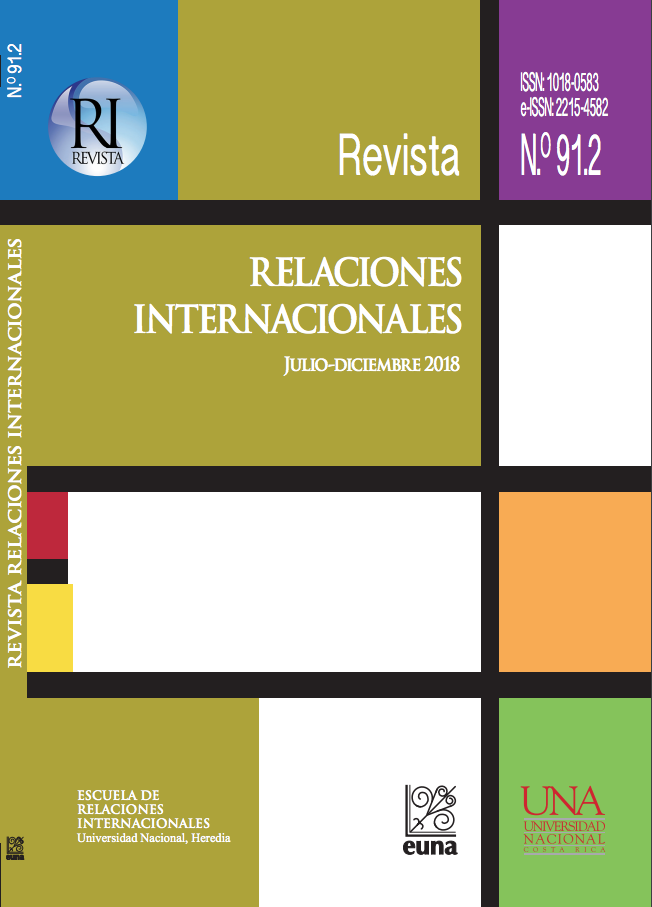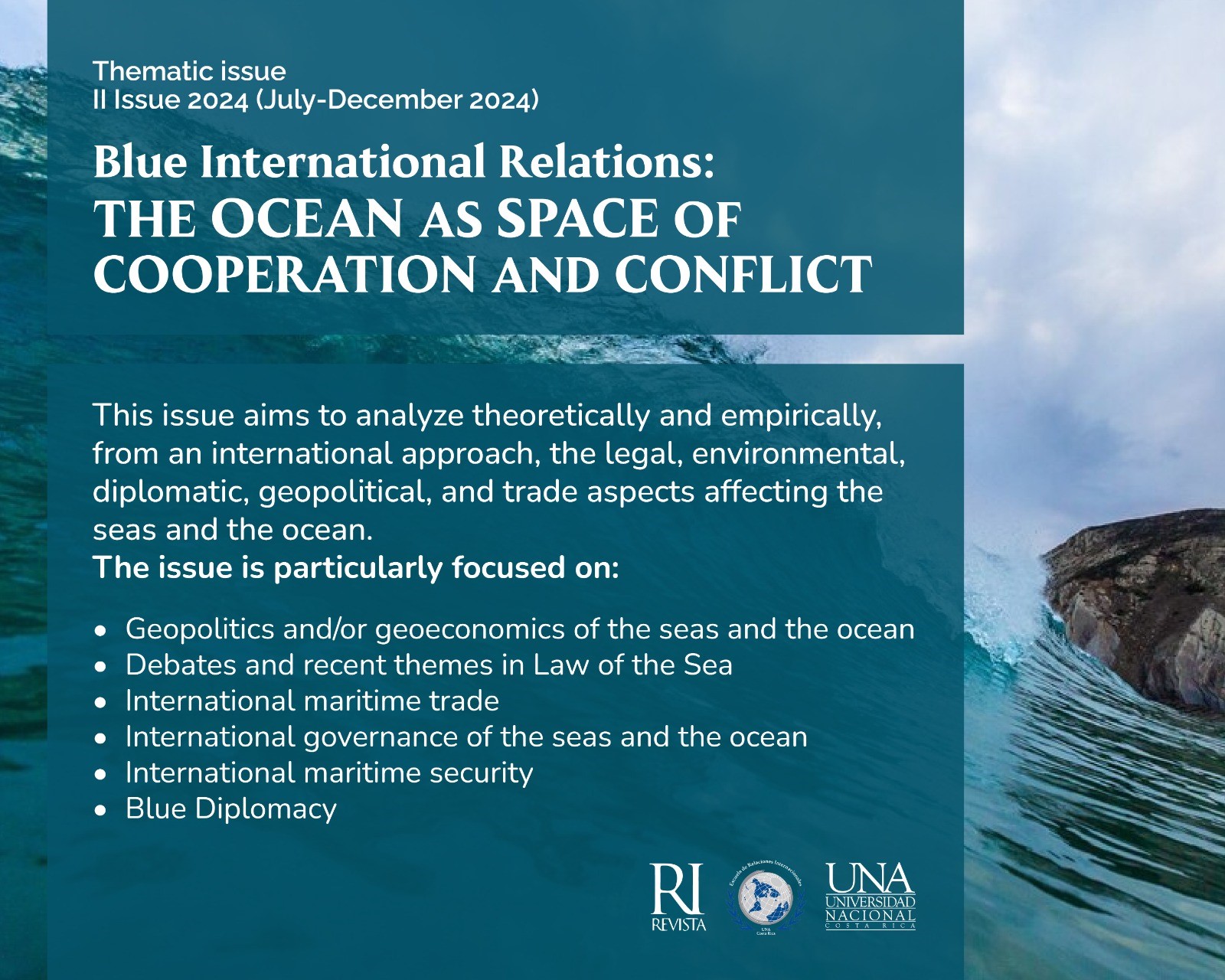From revolutionary dragon, to timid, and now rejuvenated
The stages of Chinese foreign policy
DOI:
https://doi.org/10.15359/ri.91-2.4Keywords:
China, Foreign Policy, Chinese foreign policy, Chinese contemporary foreign policy, Chinese international relations, Constructivism, Guiding principlesAbstract
Since Xi Jinping's takeover, there has been debate about the future of China's foreign policy. However, these debates lack historical or ideological context. Given the hyper-centralized nature of the Chinese political system, foreign policy must be analyzed using the Guiding Ideologies and Guiding Principles created by different leaders of the country as a foundation. This allows us to understand both the ideological factors of its foreign policy, as well as the strategies and actions that China has taken internationally. Through the analysis of primary documents, speeches, white papers and secondary documents, this research proposes that China's foreign policy (since 1949) has had three distinct stages. The first stage, which extends during the period in which Mao Zedong was in power, is characterized by the creation of Guiding Principles of foreign policy that focused on international revolutionary activism. The second stage, which begins with Deng Xiaoping and concludes with Hu Jintao (1978-2012), is defined as a timid stage, reluctant to draw attention or take leadership internationally. While the last stage, has begun with Xi Jinping (2013) and is differentiated by greater assertiveness, confidence and willingness to take leadership before the international system. This article is a brief summary of the historical and ideological factors that put in context the evolution of China's foreign policy and the relationship of Xi Jinping with the policy of its predecessors.
References
Allison, G. (2017). Destined for War: Can America and China Escape the Thucydides’ Trap. New York, NY: Houghton Mifflin Hacourt.
Bijian, Z. (2005). China's peaceful rise to great-power status. Foreign Affairs, 84(5), 18-24.
Blanchard, J.-M. F., & Guo, S. (2010). Introduction “Harmonious World” and China’s New Foreign Policy. En Jean Marc F. Blanchard & Sujian Guo (Eds.), “Harmonious World” and China’s New Foreign Policy (pp. 1–19). Lanham: Lexington Books.
Carrico, A. (2013) Grande Estratégia e o «sonho da China» de Xi Jinping. Relações Internacionais, 38 (June), 23-33.
Chai, W. (2003). The Ideological Paradigm Shifts of China's World Views: From Marxism-Leninism-Maoism to the Pragmatism-Multilateralism of the Deng-Jiang-Hu Era. Asian Affairs, 30(3), 163-175.
Chan, K. M. (2010). Harmonious society. En International encyclopedia of civil society, (pp. 821-825). Springer, New York, NY.
Cheek, T. (2002). Mao Zedong and China's revolutions: a brief history with documents. Boston, MA: Macmillan.
Chen, D. and Wang, J. (2011). Lying Low No More? China’s New Thinking on the Tao Guang Yang Hui Strategy. China: An International Journal. 9(2),195-216.
Cheng, J. Y. S., & Zhan, F. W. (2009). Chinese foreign relation strategies under Mao and Deng: a systematic and comparative analysis. Kasarinlan: Philippine Journal of Third World Studies, 14(3), 91-114.
Clements, J. (2008). The Unequal Treaties. En Wellington Koo: China(pp. 11-22). London, UK: Haus Publishing.
Denton, K. (2014) China Dreams and the ‘Road to Revival’. Origins. 8(3). Recuperado el 28 de julio de 2018 de: http://origins.osu.edu/article/china-dreams-and-road-revival.
Economy, E. C. (2014). China's Imperial President: Xi Jinping Tightens His Grip. Foreign Affairs, 93(6), 80-86.
Fewsmith, J. (2004). Promoting the scientific development concept. China Leadership Monitor, 11(30), 1-10.
Friedman, E. (2000). Globalization, Legitimacy, and Post-Communism in China: A nationalist potential for democracy, prosperity, and peace En Hung-mao Tien, Yunhan Zhu (Eds), China under Jiang Zemin (pp. 233-246). Boulder, CO: Lynne Rienner Publishers..
García García, A.(2018). El orden internacional del siglo XXI: Nuevos temas y nuevos protagonistas. Revista de Relaciones Internacionales de la UNAM, (129), 191-205.
Garver, J.W.(2015). China's Quest: The History of the Foreign Relations of the People’s Republic of China. New York, NY: Oxford University Press.
Glaser, B. S., & Medeiros, E. S. (2007). The changing ecology of foreign policy-making in China: the ascension and demise of the theory of “peaceful rise”. The China Quarterly, 190, 291-310.
Heath, T. R. (2014). China's New Governing Party Paradigm: Political Renewal and the Pursuit of National Rejuvenation. London, UK: Routledge.
Hongying, Q. (2000) Multilateralism in Chinese Foreign Policy: The Limits of Socialization. En Waxing Hu, Gerald Chan & Daojiong Zha (Eds.) China’s International Relations in the 21st Century: Dynamics of Paradigm Shifts. Lanham, MD: University Press of America.
Hu, W. (2016). Xi Jinping’s ‘Big Power Diplomacy’ and China’s Central National Security Commission (CNSC). Journal of Contemporary China, 25(98), 163-177.
Ikenberry, J. (2008). The Rise of China and the Future of the West: Can the Liberal System Survive? Foreign Affairs, 87(1), 23-37.
Jiabao, W. (2004). Carrying forward the five principles of peaceful coexistence in the promotion of peace and development. Chinese Journal of International Law, 3(2), 363-368.
Jiechi, Y.(2017). Study and Implement General Secretary Xi Jinping’s Thought on Diplomacy in a Deep-going Way and Keep Writing New Chapters of Major-Country Diplomacy with Distinctive Chinese Features. Ministry of Foreign Affairs, the People's Republic of China. Recuperado el 28 de julio de 2018 de: http://www.fmprc.gov.cn/mfa_eng/wjdt_665385/zyjh_665391/t1478497.shtml
Jinping, Xi (2015). La Gobernación y Administración de China (2da ed.) Beijing: Ediciones en Lenguas Extranjeras.
Keyser, C.H., & Lin, S. (2007). Conceptualizing Foreign Policy: The “Peaceful Rise” Debate among China’s Scholars. In Sujian Guo & Shiping Hua (Eds.), New Dimensions of Chinese Foreign Policy (pp. 41–61). Lanham, MD: Lexington Books.
Kim, S. (1994). China and the Third Wold in the Changing World Order. En Samuel S. Kim (ed) China and the World: Chinese Foreign Relations in the Post-Cold War Era. Boulder, CO: Westview Press.
La visión de Xi del mundo: Una comunidad de destino común, un hogar compartido para la humanidad (2017, enero 16) Xinhua News Agency. Recuperado el 28 de julio de 2018 de: http://spanish.xinhuanet.com/2017-01/16/c_135986889.htm,
Lam, W.(2016). Xi Jinping’s Ideology and Statecraft.Chinese Law and Government, 48(6), 409-417.
Li, X. (2013). The Taming of The Red Dragon: The Militarized Worldview and China's Use of Force, 1949–2001. Foreign Policy Analysis, 9(4), 387-407.
Mearsheimer, J. (2006) China’s Unpeaceful Rise. Current History. 105(690): 160-162.
Men, J. (2007). Changing Ideology in China and Its Impact on Chinese Foreign Policy. In Sujian Guo & Shiping Hua (Eds.), New Dimensions of Chinese Foreign Policy (pp. 7–39). Lanham, MD: Lexington Books.
Min, Y. & Xiaodil, Z (Eds) The Formation of China's "Going Global" Strategy and the Analysis of Its Promotion Policy System. China Council for the Promotion of International Trade Economic Information. Recuperado el 28 de julio de 2018 de: http://aaa.ccpit.org/Category7/Asset/2007/Jul/24/onlineeditimages/file71185259698809.pdf
Ogunsanwo, A. (1974). China's policy in Africa 1958-71. London, UK: Cambridge University Press.
Scott, D. (2007). China stands up: The PRC and the international system. London, UK: Routledge.
Shen, S. (2011). Foreign Policy. En William S. Tay & Alvin Y. So (Eds) Handbook of Contemporary China (pp. 173-202). Singapore: World Scientific Publishing Co.
Sørensen, C. T. (2015). The Significance of Xi Jinping's" Chinese Dream" for Chinese Foreign Policy: From" Tao Guang Yang Hui" to" Fen Fa You Wei". Journal of China and International Relations, 3(1): 53-73.
Suettinger, R. L. (2004). The rise and descent of “peaceful rise”. China Leadership Monitor, 12(2), 1-10.
Swaine, M. D. (2015). Xi Jinping on Chinese foreign relations: The governance of China and Chinese commentary. China Leadership Monitor, 48(1), 1-13.
Tien, H. M., & Zhu, Y. (Eds.). (2000). China under Jiang Zemin. Boulder, CO: Lynne Rienner Publishers.
Transcript: Xi Jinping's speech at the unveiling of the new Chinese leadership.(2012, noviembre 15) Xinhua News Agency. Recuperado el 28 de julio de 2018 de: https://www.scmp.com/news/18th-party-congress/article/1083153/transcript-xi-jinpings-speech-unveiling-new-chinese.
Waltz, K. N. (1988). The origins of war in neorealist theory. The Journal of Interdisciplinary History, 18(4), 615-628.
Wang, Z.(2014). The Chinese Dream: Concept and Context. Journal of Chinese Political Science, 19(1), 1-13.
Wendt, A. (1992). Anarchy is what Make of it: The Social Construction of Power Politics. International Organization, 46(2), 391-425.
Xi Jinping accepts a joint interview with media from four Latin American countries. (2014, Julio 14) Xinhua News Agency. Recuperado el 28 de julio de 2018 de: https://xidada.news/2014/07/xi-jinping-accepts-a-joint-interview-with-media-from-four-latin-american-countries_99/
Xioaping, D. (July 21,1977b), Mao Zedong Thought Must Be Correctly Understood As An Integral Whole. The Selected Words of Deng Xiaoping (vol. 2). Recuperado el 28 de julio de 2018 de: https://dengxiaopingworks.wordpress.com/2013/02/25/mao-zedong-thought-must-be-correctly-understood-as-an-integral-whole/
Zedong, M. (30 de junio de 1949). On the People’s Democratic Dictatorship. Recuperado el 28 de julio de 2018 de: https://www.marxists.org/reference/archive/mao/selected-works/volume-4/mswv4_65.htm
Zemin, J. (2002) Texto íntegro del informe de Juan Zemin en XVI Congreso del PCCh. Recuperado el 28 de julio de 2018 de: http://spanish.china.org.cn/spanish/50593.htm.
Zhang, F. (2012). Rethinking China’s grand strategy: Beijing’s evolving national interests and strategic ideas in the reform era. International Politics, 49(3), 318-345.
Zhang, J. (2015). China’s new foreign policy under Xi Jinping: Towards ‘Peaceful Rise 2.0’. Global Change, Peace & Security, 27(1), 5-19.
Zhao, Q. (1996). Interpreting Chinese Foreign Policy: The Micro-Macro Linkage Approach. New York, NY: Oxford University Press.
Zhao, S. (2016). Xi Jinping's Maoist Revival. Journal of Democracy, 27(3), 83-97.
Zheng, Y., & Tok, S. K. (2007). Harmonious society and harmonious world: China’s policy discourse under Hu Jintao. Briefing Series, 26. The University of Notingham, China Policy Institute. Recuperado el 28 de julio de 2018 de: https://www.nottingham.ac.uk/iaps/documents/cpi/briefings/briefing-26-harmonious-society-and-harmonious-world.pdf.
Zhou, H., Zhang, J., & Zhang, M. (2016). Foreign aid in China. New York, NY: Springer.
Downloads
Published
How to Cite
Issue
Section
License

Revista de Relaciones Internacionales por Universidad Nacional de Costa Rica está bajo una Licencia Creative Commons Atribución-NoComercial-SinDerivar 4.0 Internacional








1.png)







3.png)
